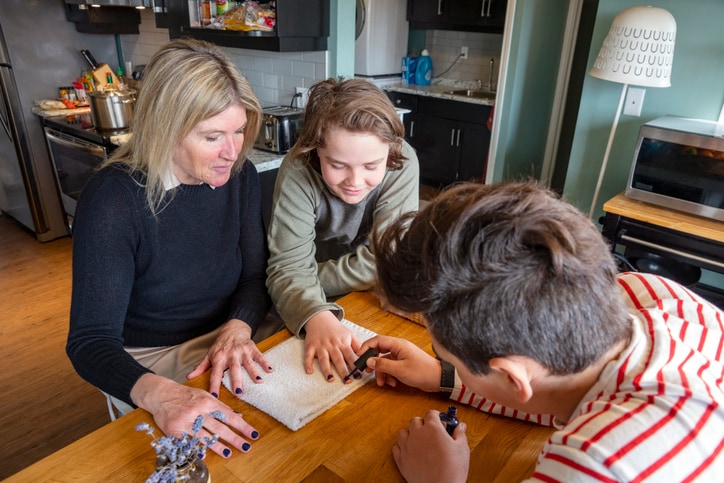The tween years are an exciting time in a child’s life and the relationship between sitters and charges this age can be particularly unique. However, caring for pre-teens is not quite the same as watching a younger child or a teenager, so understanding the characteristics and interests of kids this age will help sitters develop healthy relationships with the pre-teens in their care.
We consulted with Carol Tuttle, author of “The Child Whisperer;” Dr. Sabina Dosani, a psychiatrist and author of “Parenting Pre-Teens;” and Stephanie Felzenberg, editor of the Be the Best Nanny blog. Here they share their advice for caring for pre-teens.
-
Understand Your Charges
Tuttle says one of the primary characteristics of pre-teens is they are “starting to develop their own autonomy,” so a sitter should treat them with “rapport and respect.”Felzenberg points out, “most tweens are obsessed with popular culture, including fashion, movies, music and technology.” Fitting in is also important to kids at this age.
-
Be a Friendly Authority
“You need to be a ‘friendly authority’, not a friend,” Dosani explains. Adds Felzenberg, “Sitters and nannies are authority figures and not friends of the children in their care, but that doesn’t mean that sitters and nannies should not join children in games, projects, homework, sports or activities that interest the children.” -
Allow Some Independence
Pre-teens are learning to spread their wings a bit. As Tuttle says, “Independence increases as the child gets older.” They’re not fully mature, however. Felzenberg explains, “It is OK for caregivers to allow pre-teens independence, but nannies and sitters should still ensure their safety. Pre-adolescents need help managing their time and priorities.” -
Follow House Rules
Pre-teens might want you to bend the rules, but it’s important to stick to the guidelines parents have established. “The parents need to instruct the sitter or nanny and the children clearly about the rules of the house,” Felzenberg says. “It’s essential that parents and caregivers work together to make the rules of the home consistent.” -
Establish Discipline Standards
Kids need to understand the repercussions of breaking the rules. Tuttle encourages parents, caregivers and kids to sit down together to “create the consequence at the same time as you create the guidelines.” Felzenberg suggests a discipline contract. Losing privileges is a useful consequence for kids this age, so the contract can spell out the of privileges that will be lost if children misbehave. -
Speak Positively
Keeping your tone positive is another great discipline technique, because kids respond well to it. “Your aim is to tell them what you want them to do, rather than grumble about what they are doing wrong,” Dosani explains. Giving pre-teens specific praise encourages good behavior, so she challenges sitters to, “praise the children you are babysitting at least five times each time you look after them.” -
Get to Know the Individual
Although most pre-adolescents share characteristics, each is an individual, and sitters should get to know each child’s personality. Tuttle explains that some pre-teens are more reserved, and others are more active, and “the child’s nature will dictate” the activities he or she enjoys doing. “Nannies and sitters should ask the parents what interests pre-teens,” Felzenberg adds. -
Read Together
Reading is a great activity for all ages. “During the summer, nannies should set aside a time to allow the pre-teen to read each day as a quiet activity while the younger siblings are taking their nap,” Felzenberg advises. Sitters might also choose to read quietly during this time.Although pre-teens can read independently, reading aloud to them is still a valuable use of your time. Dosani encourages sitters to read aloud because “time spent reading to children not only develops literacy skills, but also strengthens emotional bonds and builds confiding relationships.”
-
Engage in Activities Together
Although some screen time is OK for pre-teens with their parents’ permission, it’s a good idea to encourage tweens’ creative pursuits. Tuttle says, “This is the age they can start to learn to cook.” Dosani suggests, “Try to keep one or two projects going that can be whipped out and worked on whenever you sit for them,” such as stamping note cards, sewing doll clothes or crafting holiday gifts. Felzenberg recommends, “Most tweens enjoy playing board games with their sitter.” -
Get Out
With the parents’ permission, explore your community. “Ride bikes, take a hike, go ice skating, go to the pool or to museums,” says Felzenberg. “Take your charge on a special outing to a library, and let them spend an afternoon looking at the range of titles,” encourages Dosani. Tuttle adds playdates and park visits as other out-of-the-house activities kids might enjoy.RELATED: [“5 Health Benefits of Playing Outside“]
Sitters and pre-teens can build strong relationships and enjoy their time together, but it’s up to the caregiver to understand tween behavior, abilities and interests. Follow the advice of these experts to help you get the most out your time with pre-teen charges.
Meghan Ross is a freelance writer with a background in child development, education and family life. Her work can be found here.






